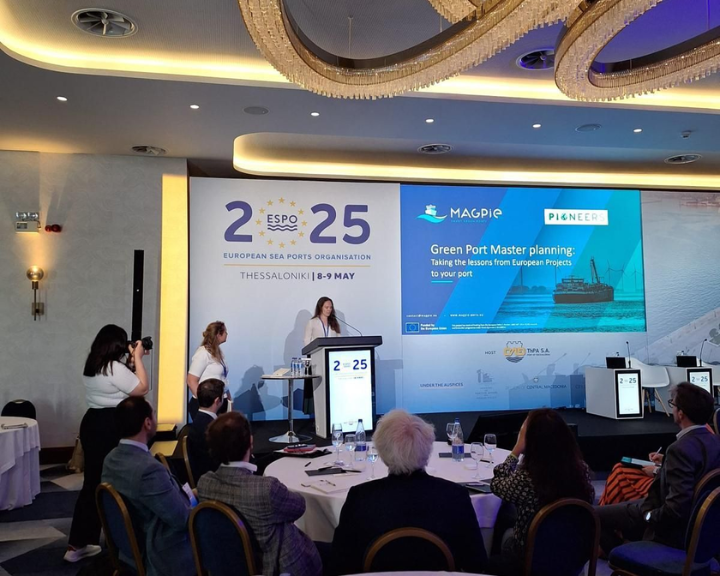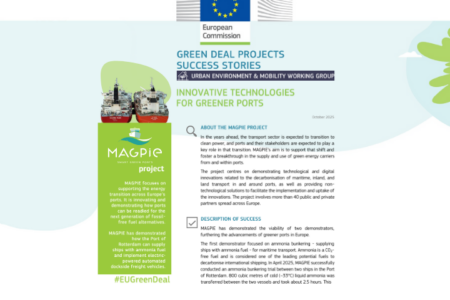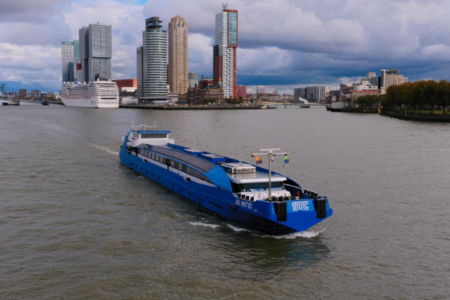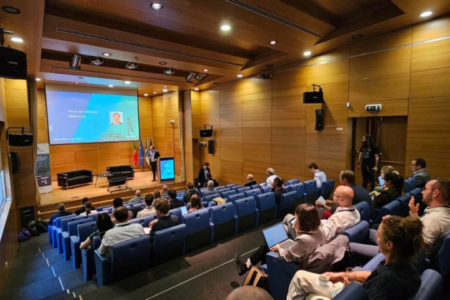
By: Caya Hein, Maaike Dalhuisen, Inge de Wolf
Introduction of the session
During the ESPO (European Sea Port Organisation) Conference 2025, which was held in Thessaloniki (Greece) on the 8th and 9th of May, MAGPIE and PIONEERS collaborated to organize a session on Green Port master planning. By the end of 2026, the EU-funded MAGPIE and PIONEERS projects will deliver a comprehensive Master Plan to help European ports achieve zero emissions by 2050. Each project is in the process of creating its own master plan at this point in time, but it is the intention to combine these to make a master plan by European ports, for European ports. To make this plan truly effective, the project representatives sought the input of ESPO members. Participants were invited to shape the future of Green Ports by sharing their insights on what the Master Plan should include, its most useful format, and the support needed for implementation. The session featured progress updates, interactive discussions, and insights. As key trade hubs, ports play a crucial role in reducing GHG emissions. Participation in this breakout helped refine the roadmap for sustainable, zero-emission ports and will directly influence the deliverables presented to the European Commission in a year’s time.
Introduction of the MAGPIE Masterplan
MAGPIE’s master plan is composed of several pieces, which include the categorisation of ports in regard to the energy transition, the creation of a Vision for Green European Ports in 2050, a Handbook of MAGPIE innovations, and a Roadmap on how to become a Green Port for 2030/2040/2050. Together, these elements provide a basis for European ports to understand what is expected of them to become a future Green Port, by when, and how they can achieve this.
Introduction of the PIONEERS Masterplan
PIONEERS Green Port Master Plan (GPMP) aims to guide ports in the transition towards net-zero. It provides a strategic framework for port ecosystems to reduce environmental impact while remaining competitive. This includes:
– Deep-diving into the barriers and drivers for the transition towards a green port.
– Inspiring port ecosystems with a wide range of viable solutions to create their own roadmap.
– Making the green port vision tangible and desirable for all stakeholders.
Tapping into the experience of over 40 partners and combining the unique qualities of four Green Port masterplans and masterplanning teams, the PIONEERS consortium leverages the diversity of ports, ecosystems, and activities to create a European handbook that is applicable to all ports aspiring to become competitive green port pioneers. By engaging stakeholders throughout the process, the GPMP fosters collaboration to ensure sustainable and resilient port ecosystems, while accelerating the transition to a low-carbon economy.
By mid 2026 all four PIONEERS ports will deliver a GPMP based on the framework of the Multi-Level Perspective (MLP). The MLP-framework provides a common, general structure to the Masterplan assuring consistency in all four plans and at the same time, the MLP provides a broader framework that allows ports to address their individual characteristics and unique challenges.
Key takeaways from the session’s discussion groups
During the discussion, several important questions were raised, and comments were made. Here, we try to briefly highlight the key takeaways that both projects need to work on to elaborate a master plan that is accepted and useful for European ports.
Many questions were centered on the link between the masterplans being explored by MAGPIE and PIONEERS and the European regulations. For instance, the responsibility of port authorities in reducing Scope 3 emissions, which are traditionally linked to shipping actors, was a key question. This also led into a discussion of the role of port authorities – are they solely landlords or can they influence industries and companies to become green in coordination with its own ambitions. One of the main questions of concern was also how competitive EU ports will be in 2050 if they are the only “green ports”?
During the session, it became clear that many ports do not have a clear master plan (aimed at long term) regarding the energy transition. Many ports are testing out technological solutions that they have seen in other ports that they believe may be of use to them, but they do not have all the necessary elements (infrastructure, regulations, economic incentives, etc.) to scale them up afterwards. The main value of a legacy platform regrouping the two master plans would be a guidance on the selection of innovations, with input on the structural analysis and timelines needed. Therefor increasing the possibilities of a long-term effect of an innovation. However, the audience highlighted that the benefits of such a joint masterplan or legacy platform need to be amplified by discussions, demonstration days, and other interactions to completely understand the solutions, their implementations, and the lessons learned from the ports that have already implemented the solutions.
European ports face many challenges, and they are struggling to prioritise key challenges and define fitting solutions. This is especially the case when considering the current geopolitical situation creating an unstable environment for many ports (which was the focus of the ESPO 2025 Conference). It is clear that there is a need for continued awareness raising and work toward a unified approach of innovation – this is where initiatives like PIONEERS and MAGPIE clearly have a role to play.


